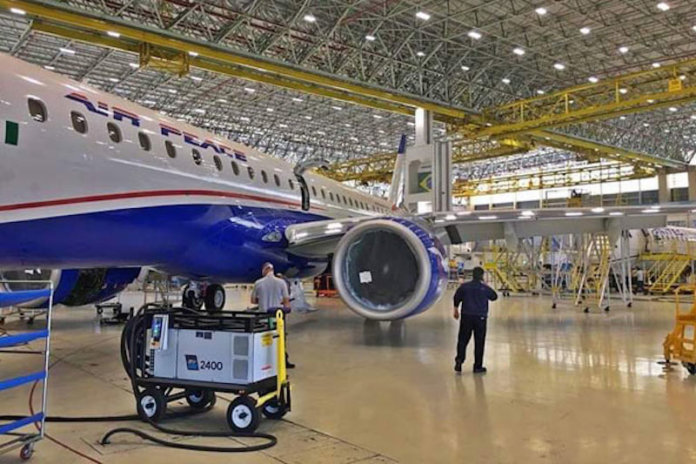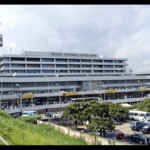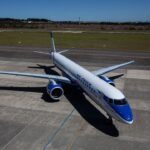
Emerging new airlines may tame current outrageous fares, boost capacity and make domestic market more competitive.
What is ironic is that when many airlines in other parts of the world are shutting down, aircraft being rested and leasing market being glutted due to devastating effects of COVID-19, Nigeria is witnessing the emergence of new airlines.
It is also at a period when aircraft maintenance facilities overseas are not working at their peak due to the pandemic, forcing aircraft due for maintenance to queue, prompting the call for major maintenance facility in Nigeria, as many aircraft at the domestic terminals in Lagos are littered with idle planes on Aircraft on Ground (AOG).
This is also a period when the Naira has lost its value against major world currencies, forcing the costs of goods and services up the ceiling, including airfares.
But the coming of new airlines gives hope to air travellers that competition in the air travel market would bring down the fares. This is one of the benefits identified by aviation experts who said that new airlines that are being registered by the Nigerian Civil Aviation Authority (NCAA) would boost the contribution of the sector to the nation’s GDP, reduce the cost of flight tickets, create more jobs and develop new flight routes and destinations.
They noted that it is surprising that despite the devastating effects of Covid-19 in the global economy, including that of Nigeria, investors are still being attracted to the aviation industry to establish new airlines at the time other parts of the world are scaling down air travel.
New airlines are emerging in Nigeria with the coming of Ibom Air, which started operations in 2019, United Nigeria Airlines, which started in February 2021, Green Africa which is poised to start operation in June, Chanchangi Airlines, which staged a come back when it obtained Air Operator Certificate (AOC) in April, NG Eagle, Binani Air, Obike Airways and Cardinal Airlines, which are in line to join the market.

More Jobs
The experts noted that more airlines joining the domestic market means that there would be more jobs for Nigerians, there would be manpower development and contribution of the aviation sector to the nation’s economy would increase.
Travel expert and organiser of Akwaaba African Travel Market, Ambassador Ikechi Uko told THISDAY that establishing new airlines means new investment into Nigeria’s economy, it means new jobs for Nigerians and development of new routes, which would benefit air travellers, but noted that existing airlines are facing the problem of capacity.
“Most of the airlines are using smaller aircraft, those that have large fleet most of them are not operational so you have an increase number of passengers. The airlines have limited supply of equipment so when the supply is not meeting the demand there is going to be a lot of problems of flight delay, flight cancellation and there will be so many reasons for aircraft on ground. Until the Nigerian airlines come back to full health, these problems will remain with us”, he said.
Former CEO of Aero Contractors, Captain Ado Sanusi told THISDAY that the emergence of new airlines is good for the nation’s economy and this was made possible by government which created conducive environment by introducing zero tariff for imported aircraft and spares, removal of VAT, which is a huge burden off domestic carriers.
“Government has put a lot of policies in place to enhance new investment in the aviation industry with the introduction of zero duty on imported aircraft and spares and the removal of VAT. We also look forward to improved foreign exchange access,” he said.
He said more airlines joining the market do not mean that they would concentrate on already established routes but many of them would develop the secondary airports, develop new routes and also enhance manpower development.
Aircraft Choice
However, Sanusi noted that the new airlines have chosen short haul aircraft because they already know the routes they want to operate and are acquiring the aircraft type that would suit those routes and disclosed that acquiring these short haul aircraft is possible because currently regional aircraft are available and affordable, as airlines in other parts of the world are resting such aircraft types due to the effect of COVID-19. So they are available for sale and for lease and in addition the coming airlines have done their studies and matched the aircraft types to the routes they intend to operate.
“The new airlines are acquiring small body aircraft. These are the airplanes that are available now for lease and for purchase. The airlines that are coming up have carried out studies and have chosen the routes that need smaller aircraft. Some routes have changed over time, some are no more functional so new routes would have to be developed.
Smaller aircraft are less expensive to run, the cost of operation is lower than bigger aircraft, but the only challenge they will face is the expertise. “They will have to train new engineers, which means providing more jobs for Nigerians. Nigeria has engineers who have expertise for Boeing 737, ATR, and Bombardier; so they would train more engineers that will specialise in the new aircraft types like Embraer 145, the Airbus A2020. Emergence of new airlines means more jobs, manpower development and better service to the passengers,” Sanusi said.
He said that some airlines might build their major operations on new airports like the ones in Kebbi, Asaba, Osubi and others and build a very good network, like flying from Yola directly to Calabar, from Owerri to Kano without a stop in Abuja, noting that the short haul aircraft can deliver high load factor with about 40 passengers.
Industry analyst and the publicity secretary of Aviation Round Table (ART), Olu Ohunayo told THISDAY that it was the best decision for emerging airlines to choose small body aircraft because they are appropriate for the market.

He said it enables airlines to increase their frequency, as it carries relatively fewer persons on every flight and enables airlines to break even with 50 per cent load factor.
“It will attract more customers because it is the right aircraft that fits the domestic and regional market, but what the airlines should ensure is that there is reliability, passenger satisfaction and safety. It costs less to maintain, especially at this time of low forex access. What the airlines with smaller aircraft need is to build maintenance facility in Nigeria so that it will cost less to maintain their aircraft,” Ohunayo said.
Low Capacity
President of Aircraft Owners and Pilots Association of Nigeria and Managing Director/CEO of Smile Air, Alex Nwuba said the new airlines would provide the needed capacity and this would help to reduce the cost of airfares, noting that existing airlines have not been able to meet the needs of the market.
“Existing airlines capacity to meet the market needs has been significantly degraded so artificial demand is created which results rather in the opportunity for carriers to increase prices. The problem however is that a new entrant may push a disruptive price strategy and reduce prices to capture market share which results in reaction from other carriers which will lead to losses and industry failure.
“However this is how free markets should operate except when a national carrier is introduced, which is meant to live off on special incentives and anticompetitive practices with dire consequences for a thin margin industry like aviation. With respect to employment more airlines should create additional jobs, which will initially absorb the large numbers of professionals out of work. If the market grows it will have long-term benefits but a disruption will have further dire consequence. Oxford economics reports that aviation contributes only 0.4 per cent to the Nigerian economy, this should grow under the right circumstances with the emerging airlines,” Nwuba said.
More Alternatives
The Managing Director, Flight and Logistics Solutions, Amos Akpan said emerging airlines means more airlines with more aircraft have come to provide services for air travelers, so existing customers will have choices from these new services.
“Operators will become innovative in the services they offer. They will create services to attract more customers. Nigerians need more air travel options. We have to increase flight frequencies to most secondary airports: Kebbi, Bauchi, Akure, Osubi, Asaba, Eket, Ibadan, Makurdi, Minna, Kaduna, Jos, Ilorin, Calabar, Sokoto need increased flight frequency. Travel by road is no longer the preferred choice and won’t be for a long time in Nigeria. What the new and incoming operators need is to design operational module to suit the environment. Choice of aircraft type, route network and size of operations is key to viability. One may cultivate the business class traveller, another may cultivate traders and economy travelers, another may choose to cultivate the mixed market, some may synchronise their schedule to distribute international passengers from the hub airports (Lagos/Abuja/Kano/Port Harcourt). Each operator will chose how to present her Service with the aircraft cabin outlay, the aircraft type, and the route,” Akpan said.
He also noted that there are also various business ventures for new airlines to pursue, especially in the general aviation sector.
“The entrance of new airlines will create employment in the sector, it will generate training needs which will improve skilled manpower. We need to stress on business modules that will make the new airlines sustainable. Cooperation among the operators will eliminate excess capacity on specific routes at certain times. Hub and spoke is good using modern propeller aircraft.
“There are also various business ventures for new airlines to pursue especially in the general aviation sector. The entrance of new airlines will create employment in the sector; it will generate training needs, which will improve skilled manpower. We need to stress on business modules that will make the new airlines sustainable. Cooperation among the operators will eliminate excess capacity on specific routes at certain times. Hub and spoke is good using modern propeller. Yes! Nigerian aviation industry can take up to 50 operators and more if the business opportunities in general aviation is exploited,” Akpan added.

Airfares
On whether the emerging airlines will drive down fares, the Chief Operating Officer and Accountable Manager of Dana Air, Obi Mbanuzuo warned that it is economic parameters, not more airlines that determine airfares. He said that airfares are dependent on cost of operation and noted that no airline would sell ticket that would keep it unprofitable.
“To be honest with you, we have to look at more of the input into, because the fare is dependent on the cost of the operation. No airline will sell a ticket that keeps them unprofitable. So a lot of the input in the airline business in Nigeria is dependent on foreign maintenance of its aircraft for the input, let me give you an example, two of our aircraft is in Europe now for maintenance. So 99 per cent of all the maintenance is done abroad. Yes we have MRO (maintenance facility) locally but the level of service it can offer is limited and there is a lot of aircraft parked here and there, queuing for checks.
“So the situation is not always ideal. Maintenance is largely done overseas, all the spare parts are acquired in foreign currency; so the question of when people will have affordable fares is a function of the economy of the country. If the foreign currency is rising day by day; then I am afraid I cannot give you any hope that things will get better until the general economic situation gets better. Unfortunately the operating environment is not conducive. And apart from the input, we always talk about leasing, purchasing aircraft, when those things are sourced from abroad in foreign currency, I don’t see light at the end of the tunnel soon,” he said.






